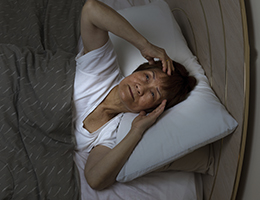
Oct. 16, 2019—Insomnia and depression often go hand in hand. Depression can make it difficult to fall or stay asleep. And sleepless nights can make someone feel anxious, irritable and depressed.
But the consequences of lost sleep can be more severe than a bad mood the next day. More than 30 studies have linked chronic insomnia to suicidal thoughts or actions.
That why researchers in a new study decided to look at whether treating insomnia could reduce suicide risk.
How the study worked
The study involved over 100 people with major depression, insomnia and suicidal thoughts. Nearly one-third of them had previously attempted suicide. (For safety, people in imminent danger of suicide were excluded.) All of the participants were given an antidepressant. Half also received the sleep aid zolpidem (brand name Ambien) to take at bedtime.
For eight weeks, each person kept a daily diary that detailed how they were sleeping—for example, how often they woke up at night and how long they slept—and gave reports to researchers.
At regular visits, staff also measured known risk factors for suicide, including:
- Distorted thoughts about sleep, such as believing they'd never have a good night's sleep again.
- How often they had distressing dreams or nightmares.
- Scores on a scale that measures pessimism and negative thoughts.
Rest for the weary
At the end of eight weeks, the people taking the sleep aid showed significant improvement in their insomnia. And while both groups had improvements in their overall quality of life, the group taking the sleep aid had a greater reduction in suicidal thinking. Patients with the most severe insomnia seemed to benefit the most. And there were no suicide attempts or deaths during the study.
Because sleep aids can be habit-forming or used to overdose, patients were given just a week's supply at a time, and they were limited to eight weeks. But even two weeks after they stopped, they still maintained the improvements they'd made.
While researchers don't believe sleep aids are warranted in every case, they say people with severe insomnia may have a lot to gain from targeted treatment for both their insomnia and their depression, especially if they're at risk for suicide.
The study appeared in The American Journal of Psychiatry.
Do you have insomnia?
Insomnia is trouble falling or staying asleep. Symptoms can include:
- Lying awake for a long time before falling asleep.
- Sleeping for only short periods.
- Being awake for much of the night.
- Feeling as if you haven't slept at all.
- Waking up too early.
If you think you have insomnia, talk with your doctor. Treatments are available.
Here's some advice for talking with your doctor about sleep problems.